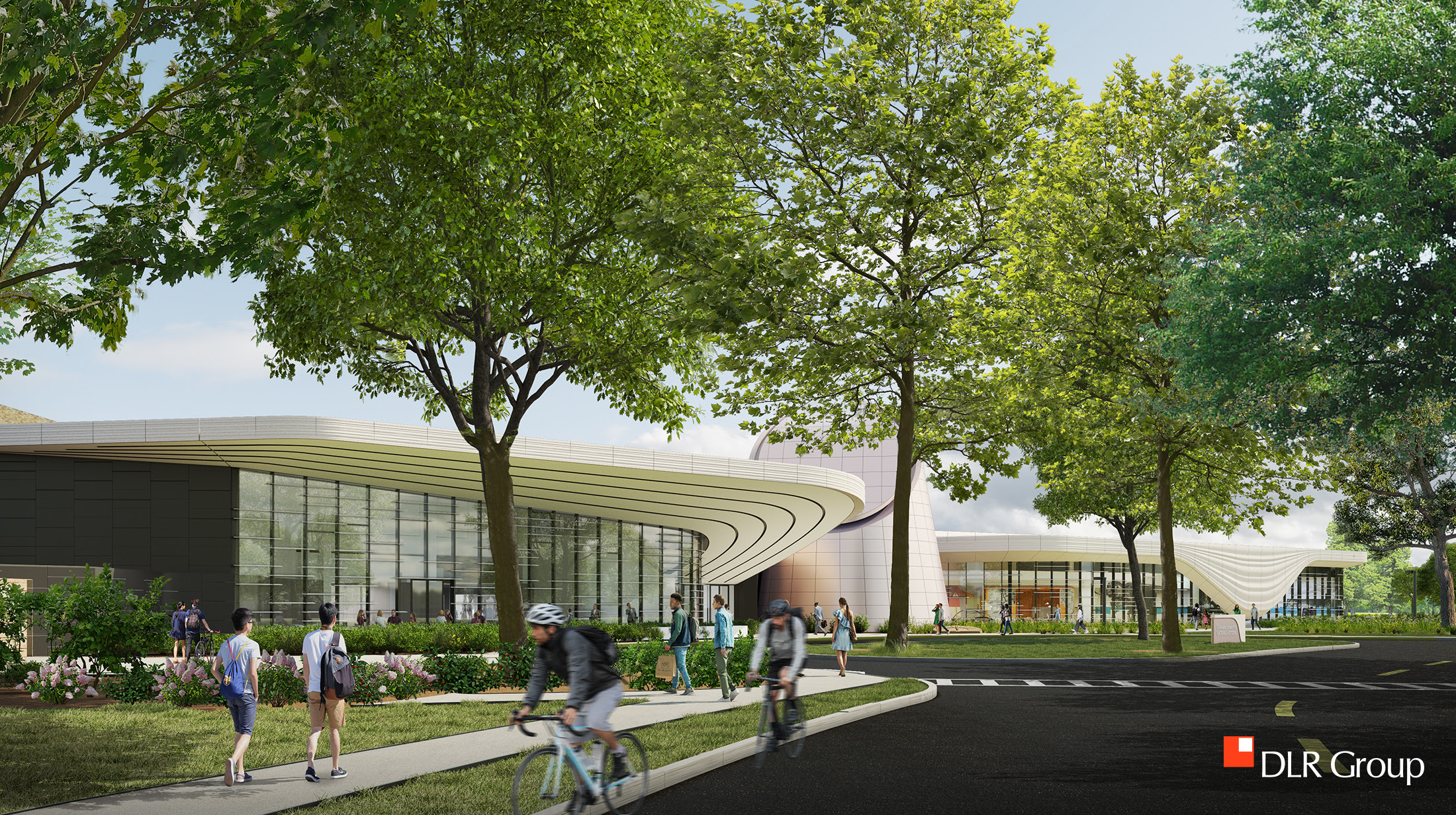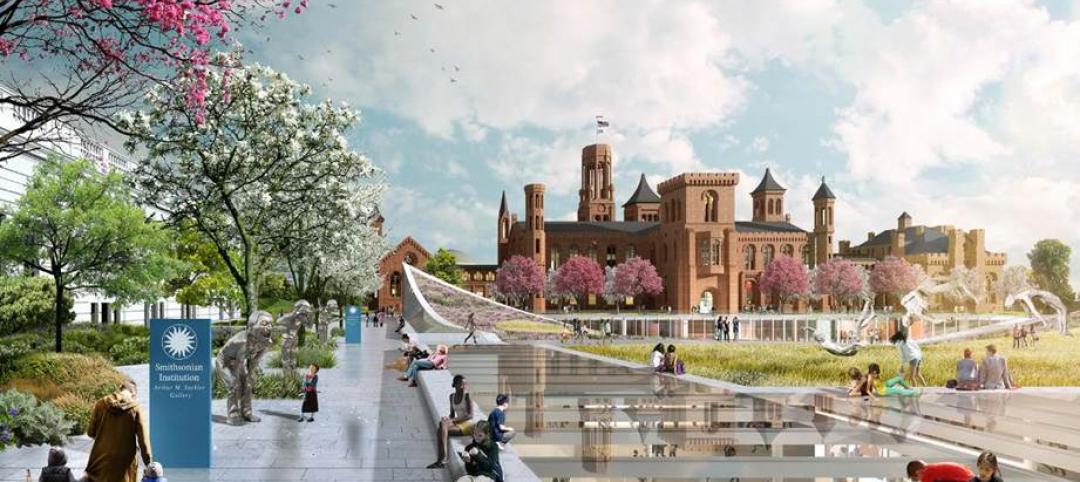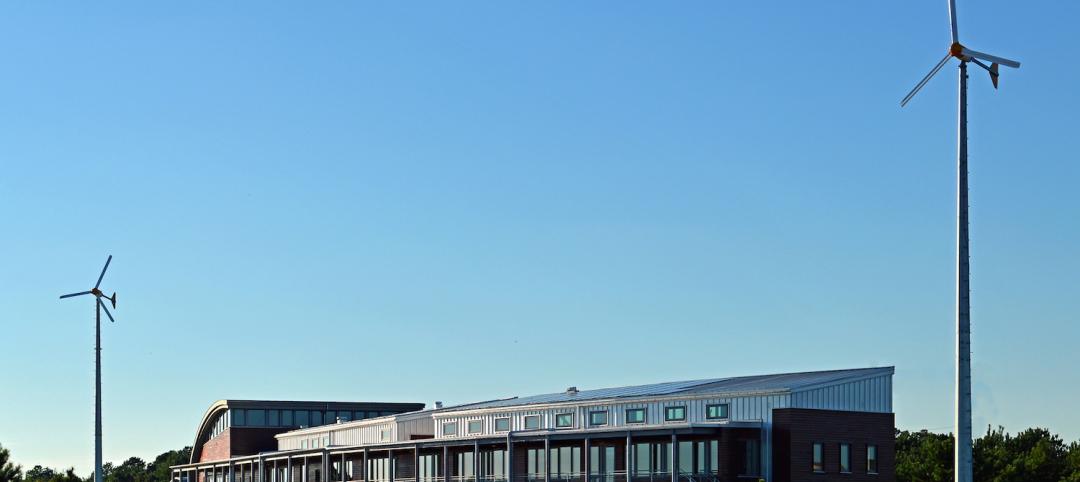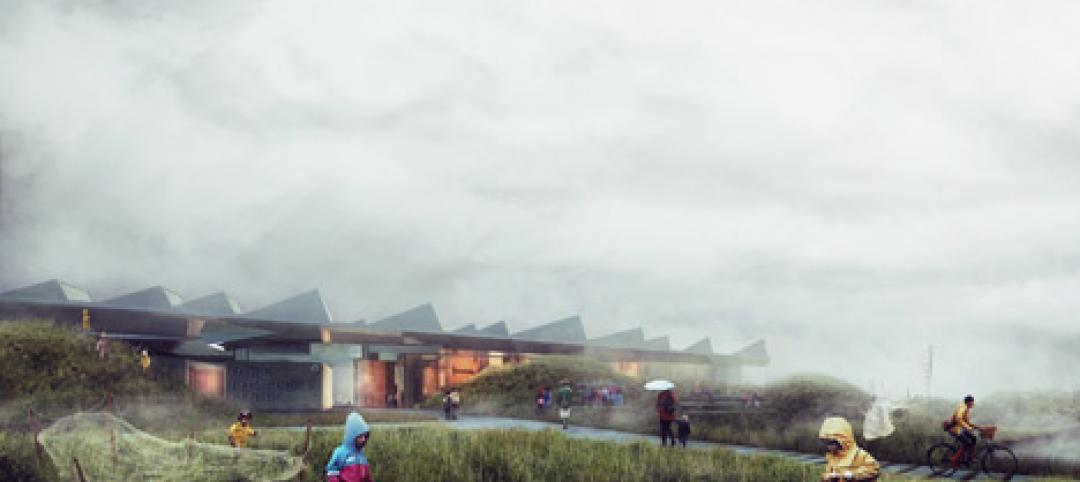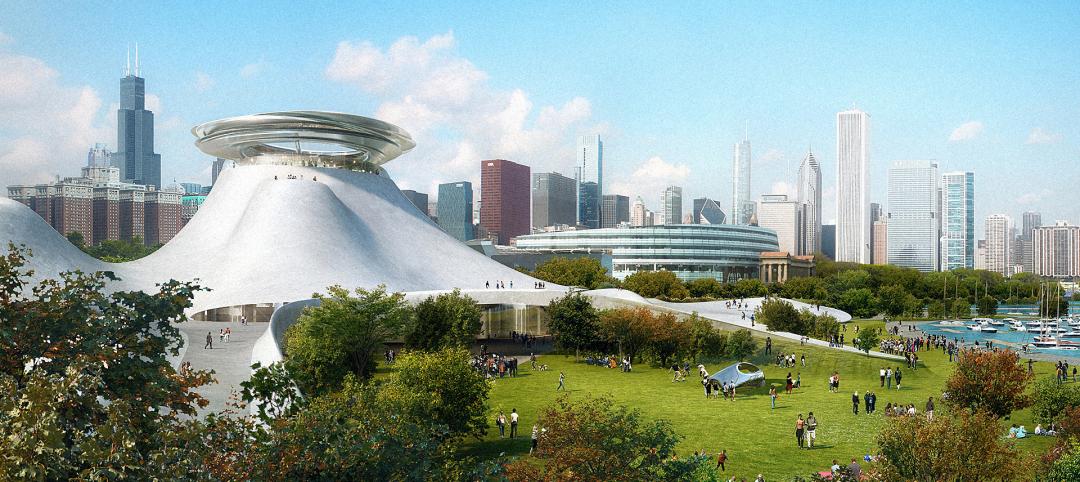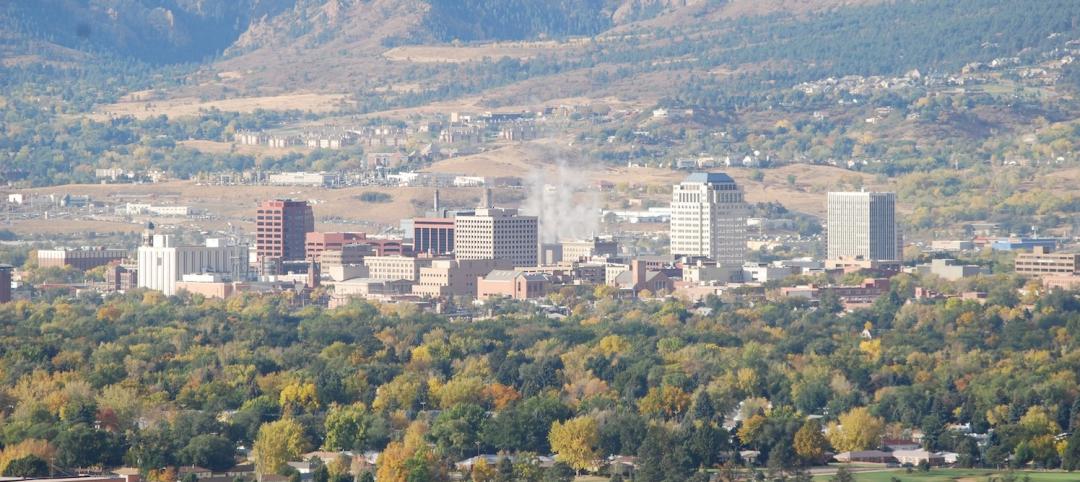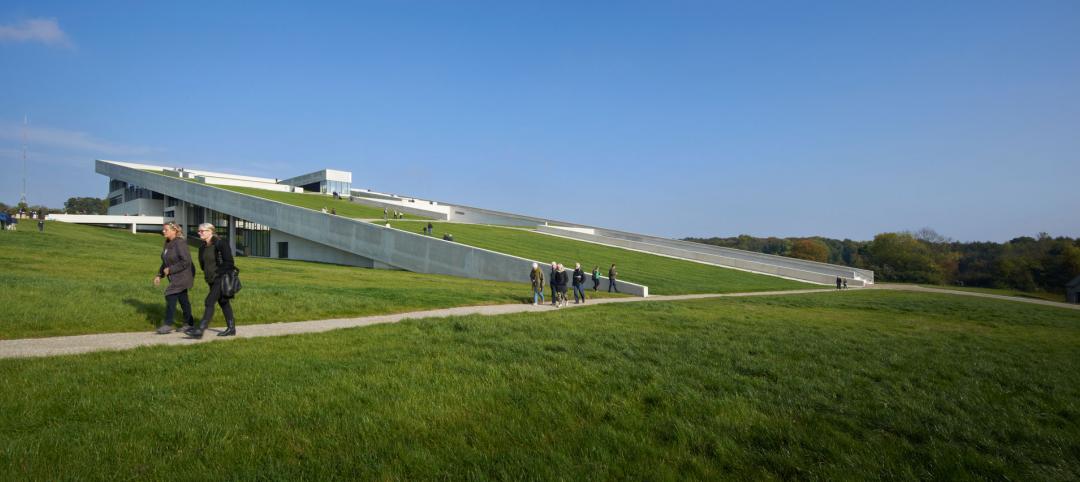Last December, the 100-year-old Cleveland Museum of Natural History completed an $8.9 million overhaul of its Thelma and Kent H. Smith Environmental Courtyard and the upgrade of its 450-seat Murch Auditorium. The courtyard was one of several “gateway” projects that have been interim stages of a $150 million expansion and renovation of the Museum, whose new 50,000-sf Exhibit Hall, main lobby, and café are scheduled to break ground this Thursday.
Sonia Winner, the Museum’s President and CEO, told the Cleveland Plain Dealer that the institution was also planning an $11.4 million upgrade of its central utility plant.
Since 1958, when the Museum moved to its current location, it has expanded at least six times. The latest expansion, designed by DLR Group, will feature a curving, snow-white roof made from cast-concrete panels and intended to evoke the glacier that covered Northeast Ohio during the last ice age. (Panzica Construction is the GC on this project.)
The museum’s latest expansion and renovation will create new exhibits, developed by Gallagher & Associates, and add curatorial posts for the purposes of connecting, in new ways, the Museum’s collections and research with public education and programming.
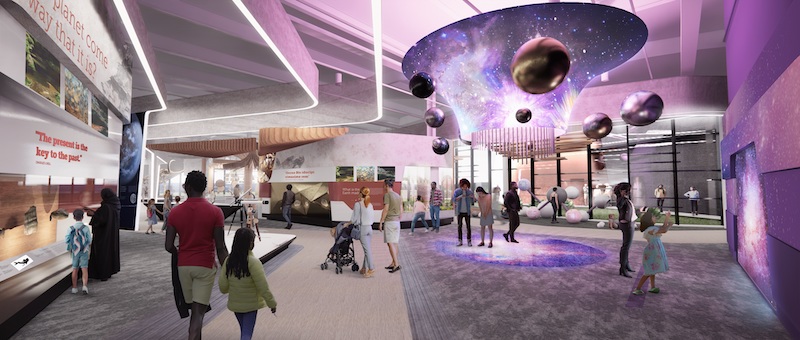
A rendering of the Museum's Planetary Process Gallery. The Museum's exhibit reorganization will attempt to connect humanity to the larger universe. Image: Gallagher & Associates
RETELLING HISTORY’S MARCH
The museum, which pre-pandemic was drawing 260,000 visitors annually, holds more than five million artifacts and specimens, and, through its Natural Areas program, stewards more than 11,000 acres of nature preserve in Northeast Ohio. Massive new exterior glass walls will wrap around the addition’s façade to open sightlines between the exhibits and the surrounding landscape of Wade Oval.
Inside, the traditional museum organization—by time period, geography, and species—is being deconstructed to tell integrated stories of planetary and biological processes.
The goal of this “reinvention” is to show more clearly how humanity intersects with the continuum of life on Earth and universal forces.
“We are creating a new model for natural history museums that uses the past to inform our present to build a better future together,” explains Winner. “Our reimagined museum will illuminate the interconnectedness of human life and the natural world, and how science is essential to our lives.”
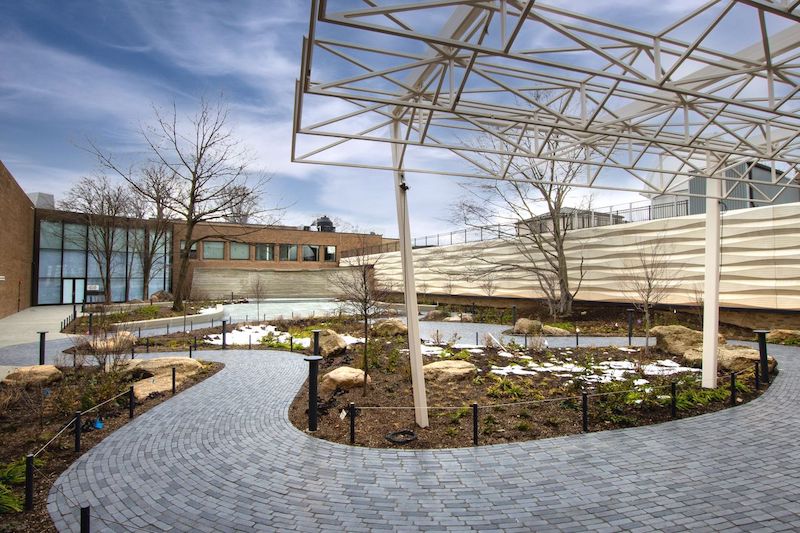
An “environmental courtyard,” which received an $8.9 million makeover, now serves as one of the Museum's gateways. Image: Cleveland Museum of Natural History
EVOLUTION ON DISPLAY
The museum addition (parts of which are scheduled to open next year) is being constructed on what currently is a parking lot, and will include a central welcome and orientation area, another gateway. The new Visitors Hall will feature a reconstruction of “Lucy,” the 3.2-million-year-old human ancestor that a team of Cleveland museum scientists first discovered 45 years ago, as well as a geological sample collected from the Moon, and specimens of modern-day animals to illustrate evolutionary and biological changes.
A new self-guided interactive space, The Ames Family Curiosity Center, is meant to connect the museum’s collections with its visitors’ lived experiences and global science-related news.
The addition and renovation should be completed sometime in 2024.
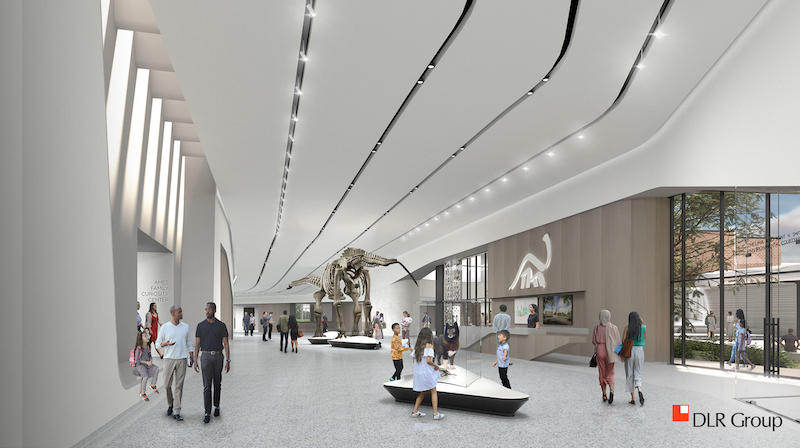
Each of the Museum's exhibitions will be part of a larger evolutionary story. Image: DLR Group
Related Stories
| Nov 14, 2014
Bjarke Ingels unveils master plan for Smithsonian's south mall campus
The centerpiece of the proposed plan is the revitalization of the iconic Smithsonian castle.
| Nov 12, 2014
Chesapeake Bay Foundation completes uber-green Brock Environmental Center, targets Living Building certification
More than a decade after opening its groundbreaking Philip Merrill Environmental Center, the group is back at it with a structure designed to be net-zero water, net-zero energy, and net-zero waste.
| Nov 7, 2014
NORD Architects releases renderings for Marine Education Center in Sweden
The education center will be set in a landscape that includes small ponds and plantings intended to mimic an assortment of marine ecologies and create “an engaging learning landscape” for visitors to experience nature hands-on.
| Nov 5, 2014
The architects behind George Lucas' planned Chicago museum unveil 'futuristic pyramid'
Preliminary designs for the $300 million George Lucas Museum of Narrative Art have been unveiled, and it looks like a futuristic, curvy pyramid.
| Nov 3, 2014
IIT names winners of inaugural Mies Crown Hall Americas Prize
Herzog & de Meuron's iconic 1111 Lincoln Road parking garage in Miami Beach, Fla., is one of two winners of the $50,000 architectural prize.
| Oct 29, 2014
Diller Scofidio + Renfro selected to design Olympic Museum in Colorado Springs
The museum is slated for an early 2018 completion, and will include a hall of fame, theater, retail space, and a 20,000-sf hall that will showcase the history of the Olympics and Paralympics.
| Oct 23, 2014
Prehistory museum's slanted roof mimics archaeological excavation [slideshow]
Mimicking the unearthing of archaeological sites, Henning Larsen Architects' recently opened Moesgaard Museum in Denmark has a planted roof that slopes upward out of the landscape.
| Oct 16, 2014
Perkins+Will white paper examines alternatives to flame retardant building materials
The white paper includes a list of 193 flame retardants, including 29 discovered in building and household products, 50 found in the indoor environment, and 33 in human blood, milk, and tissues.
| Oct 15, 2014
Harvard launches ‘design-centric’ center for green buildings and cities
The impetus behind Harvard's Center for Green Buildings and Cities is what the design school’s dean, Mohsen Mostafavi, describes as a “rapidly urbanizing global economy,” in which cities are building new structures “on a massive scale.”
| Oct 12, 2014
AIA 2030 commitment: Five years on, are we any closer to net-zero?
This year marks the fifth anniversary of the American Institute of Architects’ effort to have architecture firms voluntarily pledge net-zero energy design for all their buildings by 2030.


